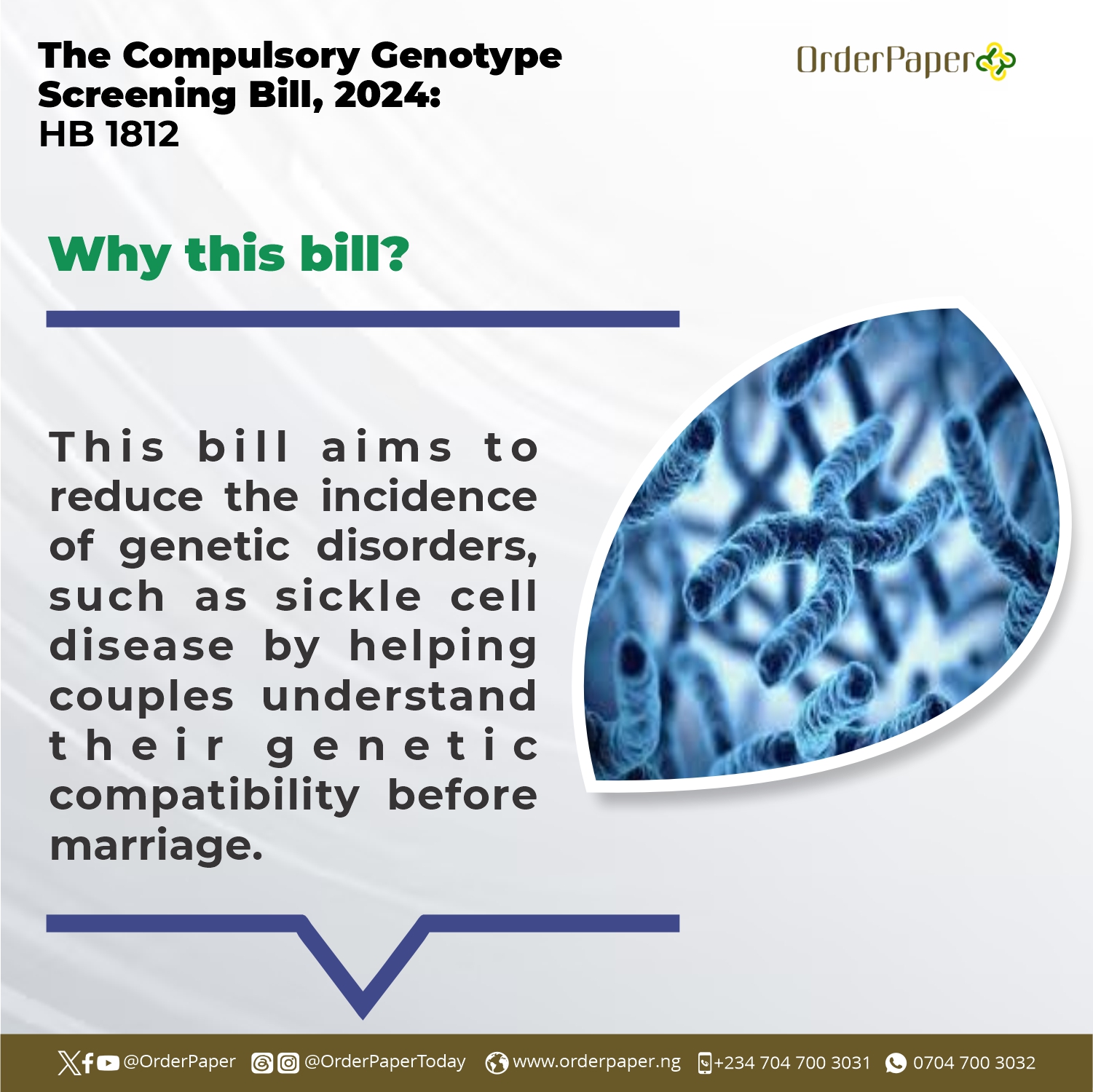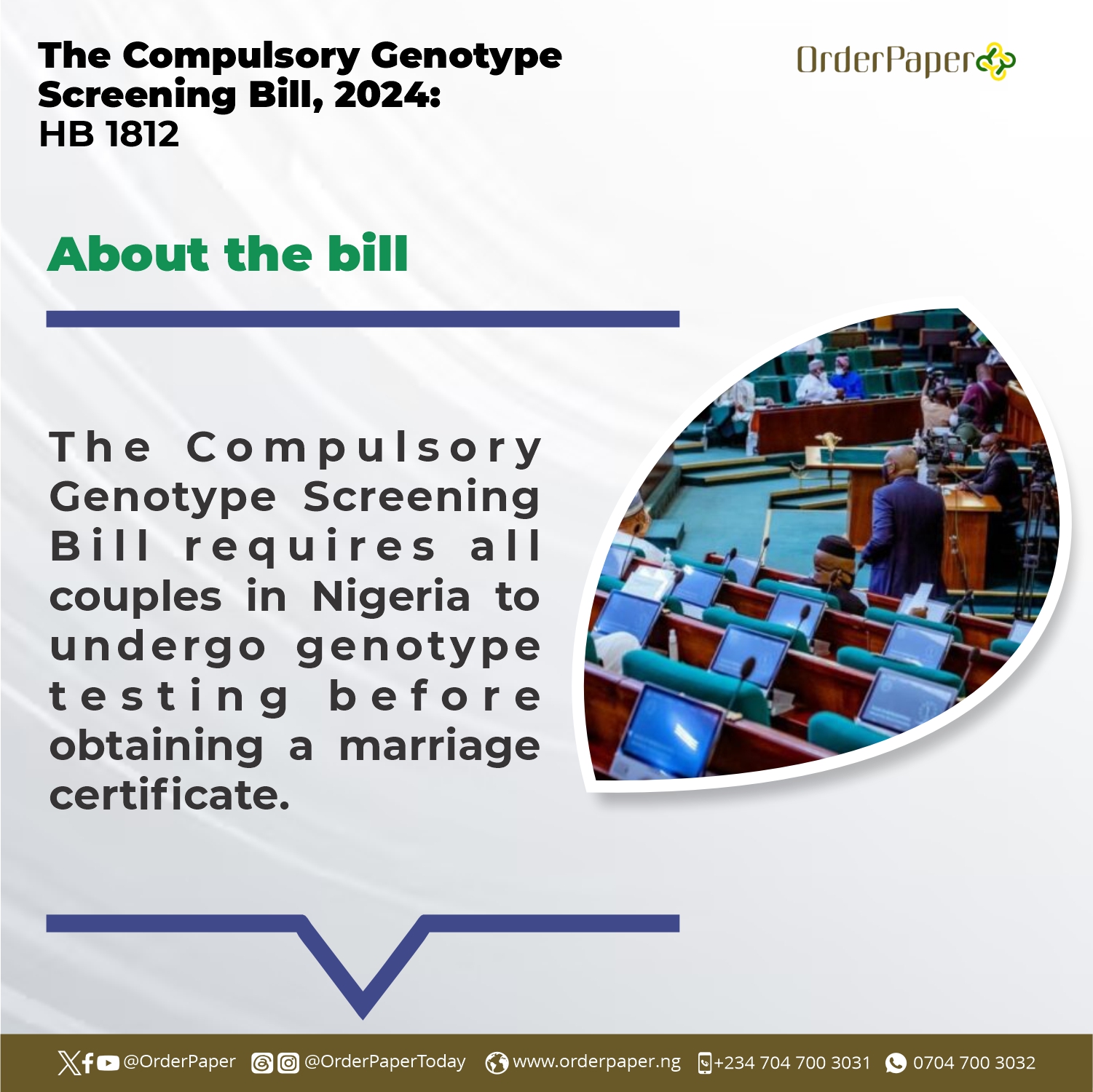In response to ongoing public health challenges, the House has received a bill to tackle the burden of sickle cell disease in the country. The bill prescribes severe penalties for non-compliance.

Sickle cell disease (SCD) has been a significant public health issue in Nigeria for decades, and its impact has evolved over the years. Research has also shown that Nigeria has one of the highest burdens of sickle cell disease in the world.
The high prevalence of SCD in Nigeria, and its associated morbidity and mortality, is driven by many factors including ignorance to genotype screening from intending couples. SCD is autosomal recessive, which means that a person must inherit two copies of the sickle cell gene (one from each parent) to have the disease, and the risk of having a SCD baby remains high after a marriage between two heterozygous couples.
One of the most effective ways to reduce the incidence of sickle cell disease is through genotype screening, which can help individuals understand their genetic makeup before making life-altering decisions like marriage or having children. However, despite its effectiveness, many Nigerians still marry without understanding the potential genetic risks, largely due to a lack of awareness about the importance of genotype screening.
In response to this ongoing public health challenge, the House of Representatives has received a bill aimed at tackling the high burden of sickle cell disease in the country.
Understanding the Genotype Screening Bill
The bill, sponsored by Rep. Akin Rotimi (APC, Ekiti), aims to prevent the birth of children with sickle cell disease by requiring that intending couples undergo genotype screening at health facilities approved by the Federal Ministry of Health or other designated health authorities. The results must be submitted to the marriage registry as part of the documentation required to obtain a marriage certificate.
Mandating all marriage registries to ensure compliance before issuing Marriage Certificates, the bill warns that any Marriage Certificate issued in contravention shall be considered null and void and will be liable on conviction of a fine not exceeding N500,000 or imprisonment for a term not exceeding one year or both.
Key objectives of the bill are:
- Public health promotion: By ensuring that couples are aware of their genotype status, the proposed law seeks to reduce the incidence of sickle cell disease and other genetic disorders, ultimately promoting healthier families and communities.
- Informed decision making: Couples will be able to make informed decisions about marriage and family planning, knowing the genetic risks involved. This could lead to more people seeking genetic counselling before starting a family.
- Legal and regulatory compliance: The bill also imposes strict penalties on marriage registries and healthcare providers who fail to comply with the proposed regulations. Any marriage certificate issued without the required genotype screening will be considered null and void, and the responsible registry could face fines or imprisonment. Similarly, health facilities that provide false genotype results will be penalised with fines and possible jail time.

- Penalties for non-compliance
To ensure effective enforcement, the bill prescribes severe penalties for non-compliance. These include:
- Marriage registry violations: Any marriage registry that issues a certificate without confirming the results of genotype screening will face fines of up to ₦500,000 or a prison sentence of up to one year, or both.
- Fraudulent health facilities: Healthcare providers that issue false genotype results or engage in fraudulent activities related to genotype screening will face fines of up to ₦1,000,000 or a prison sentence of up to two years, or both.
These penalties aim to deter fraudulent practices and ensure that the law, when passed, is enforced consistently across the country.
- Public awareness and education campaigns
Beyond the enforcement of legal requirements, the bill also emphasises the importance of public education and awareness. The Federal Ministry of Health will spearhead public campaigns to educate Nigerians about the significance of genotype screening and its impact on public health. These campaigns will highlight the risks of marrying without knowing one’s genotype and the benefits of making informed decisions that could prevent the birth of children with sickle cell disease.
The public awareness campaigns will target various communities, particularly in rural areas where awareness about genetic conditions may be lower. These initiatives will include outreach programs, media campaigns, and educational workshops in health facilities and local communities to provide information about the importance of genotype screening.

- More on genotype screening
Genotype screening, also known as genetic testing, is a process that involves analysing a person’s DNA to determine their genetic makeup. This test is essential for identifying inherited genetic conditions such as sickle cell disease, cystic fibrosis, and other hereditary disorders.
Genotype screening can be performed using various biological samples, including blood, saliva, or buccal swabs (cells from the inside of the cheek). It is typically a quick and non-invasive procedure that provides critical information for making informed health decisions.
- Types of genetic testing
There are several types of genetic testing, each serving different purposes:
- Diagnostic testing: This type of test is used to confirm or rule out a suspected genetic condition. It is often used when a person exhibits symptoms of a genetic disorder.
- Predictive testing: This test assesses the likelihood of an individual developing certain diseases, particularly in those who have a family history of the condition.
- Carrier testing: Carrier testing helps determine whether an individual carries a gene for a recessive inherited condition, such as sickle cell disease, without showing symptoms themselves. This is particularly important for family planning.
- Pharmacogenetic testing: This test evaluates how an individual’s genetic makeup affects their response to certain medications, helping doctors choose the most effective treatments.
- Prenatal testing: Conducted during pregnancy, prenatal genetic testing determines the genetic status of the foetus to detect potential abnormalities such as Down Syndrome or sickle cell disease.
- Nutrigenetic Testing: This newer form of genetic testing looks at how an individual’s genetic makeup affects their response to specific foods or nutrients.
- The impact of a genotype screening law
The proposed law has the potential to drastically reduce the incidence of sickle cell disease in Nigeria, saving thousands of lives and alleviating the significant economic burden that the disease places on families and the healthcare system. By promoting public awareness of genetic risks and encouraging responsible family planning, the government hopes to create a healthier population and reduce the long-term costs of treating chronic genetic conditions.
